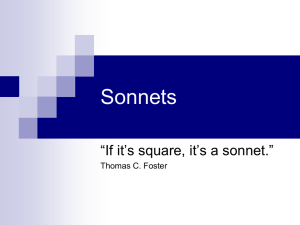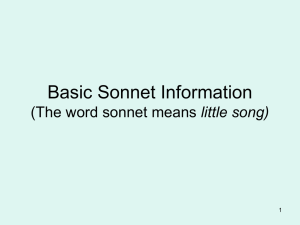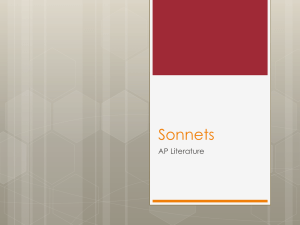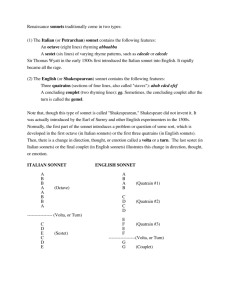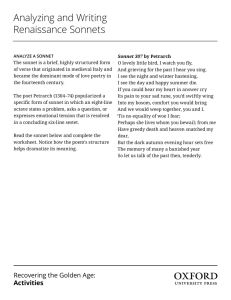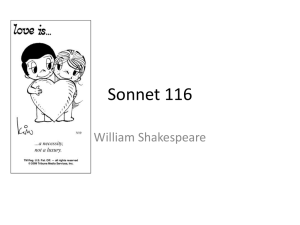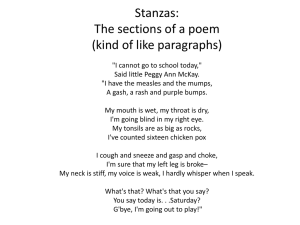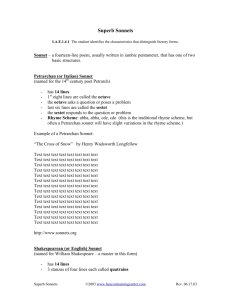The Sonnet
advertisement
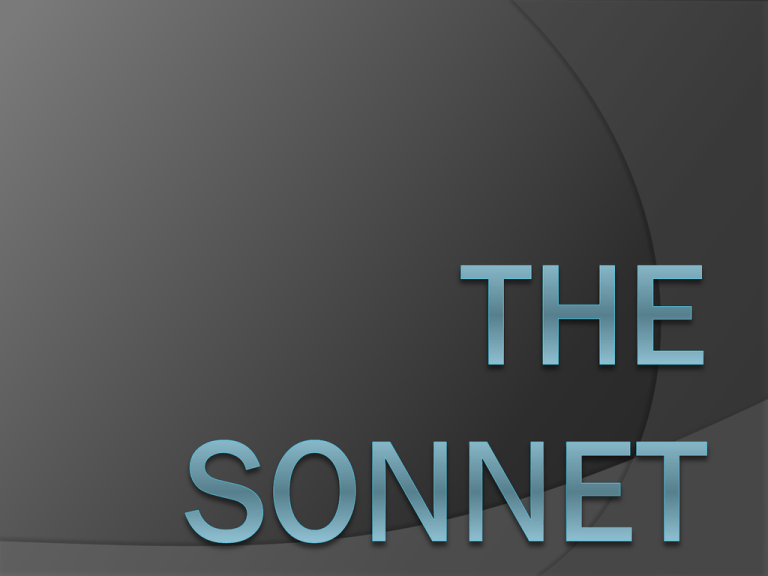
A sonnet is a very strict form with a lot of rules… A sonnet is a lyric poem All sonnets have fourteen lines Sonnets are written in iambic pentameter Sonnets have a strict rhyme scheme Sonnets have a definite thought structure The Two Types of Sonnets Shakespearean Also called Elizabethan or English Divided into 3 quatrains and 1 couplet Rhyme Scheme= ABAB CDCD EFEF GG Petrarchan Also called Italian Divided into an octave and a sestet Rhyme Scheme= ABBA ABBA CDECDE or ABBA ABBA CD CD CD An iamb is a metrical foot or unit consisting of two syllables: a unstressed syllable: U followed by an stressed syllable: / a im U mor U gain / tal / U ize / Iambic pentameter 1 2 U U / U 4 / U 5 / U / One day /I wrote/ her name/ upon/ the strand, U / U / U / U /U / But came the waves and wash ed it a way: U / 3 /U / U / U / U / A gain I wrote it with a second hand, U / U / U / U / U / But came the tide, and made my pains his prey - Edmund Spenser, Amoretti, Sonnet 75 Rhyme scheme Like we said earlier… there are two types of sonnets. Each has a different rhyme pattern: Petrarchan (Italian) rhyme scheme: abba, abba, cd, cd, cd abba, abba, cde, cde Shakespearean (English, or Elizabethan) rhyme scheme: abab, cdcd, efef, gg Let’s take a look at a Shakespearean Sonnet…. First we’ll examine the form… How many lines will it have? What type of stanzas are those lines divided into? How many syllables in each line? And the rhyme scheme? Sonnet 27 1. Weary with toil, I haste me to my bed 2. The dear repose for limbs with travel tired; 3. But then begins a journey in my head 4. To work my mind, when body's work's expired: 5. For then my thoughts--from far where I abide 6. Intend a zealous pilgrimage to thee, 7. And keep my drooping eyelids open wide, 8. Looking on darkness which the blind do see: 9. Save that my soul's imaginary sight 10. Presents thy shadow to my sightless view, 11. Which, like a jewel hung in ghastly night, 12. Makes black night beauteous, and her old face new. 13. Lo! thus, by day my limbs, by night my mind, 14. For thee, and for myself, no quiet find. A B A B C D C D E F E F G G Let’s take a look at the rhyme scheme of this sonnet… Thought structure Every Shakespearean sonnet is made up of three quatrains and a couplet Quatrain, quatrain, quatrain, couplet Each quatrain, four lines, describes an idea or situation which leads to a conclusion or response in the couplet, two lines. 1. Weary with toil, I haste me to my bed, 2. The dear repose for limbs with travel tired; 3. But then begins a journey in my head 4. To work my mind, when body's work's expired: The first quatrain describes that the speaker needs to rest but cannot mentally rest. The 2nd quatrain 5. For then my thoughts--from far where I abide— describes the reason the speaker 6. Intend a zealous pilgrimage to thee, cannot rest 7. And keep my drooping eyelids open wide, (thinking of a loved 8. Looking on darkness which the blind do see: one). The 3rd quatrain 9. Save that my soul's imaginary sight explains that his 10. Presents thy shadow to my sightless view, beloved will light 11. Which, like a jewel hung in ghastly night, the darkness of 12. Makes black night beauteous, and her old face new. the night even in thought. 13. Lo! thus, by day my limbs, by night my mind, The couplet sums 14. For thee, and for myself, no quiet find. this up. The . poem concludes that the speaker will not rest. Scansion Homework: Write two lines of iambic pentameter and mark the scansion Then, write two lines of trochaic pentameter and mark the scansion

